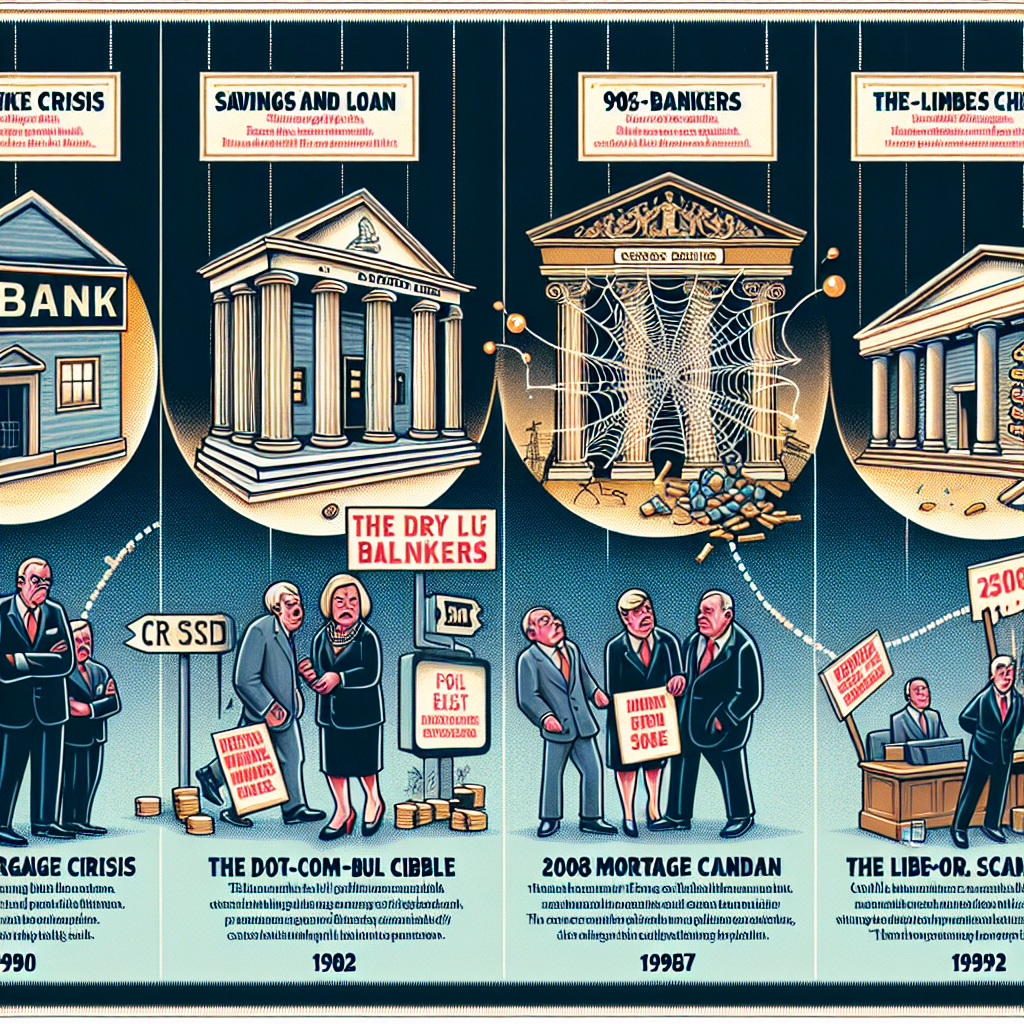Banking Scandals Through History: From the Savings and Loan Crisis to LIBOR
The world of finance can often feel like a labyrinth of numbers and policies that only accountants understand. Yet sometimes, even within this structured realm, chaos ensues, often leaving the rest of us with headlines that elicit both shock and disbelief. Banking scandals are a testament to this turmoil, each with lessons learned and stories told. Let’s take a walk through memory lane, exploring some notorious banking scandals from the Savings and Loan Crisis to the infamous LIBOR scandal.
The Savings and Loan Crisis: A Costly Misadventure
In the 1980s, the United States faced a banking debacle known as the Savings and Loan Crisis, an event that sent ripples through the nation’s economy. The crisis wasn’t just a hiccup; it was a full-fledged financial headache with severe consequences.
- The Savings and Loan institutions primarily focused on home loans. However, deregulation in the 1980s led to risky investments—like handing a teenager a credit card with no limit. What could go wrong?
- Interest rates soared, and many S&Ls found themselves in a precarious situation, unable to keep up with their liabilities. The result? Over a thousand institutions failed.
- In the end, the American taxpayers were left with a hefty bill of about $132 billion to cover the government bailout. It’s akin to buying a house and discovering you have to pay for the neighbor’s pool–twice.
If you’re thirsting for more stories of economic intrigues and updates in the world of finance, consider checking out some Popular Economics Channels on Telegram that delve into current economic events with an insightful twist.
Barings Bank: The Queen’s Bank Bows Out
Picture this: a single, rogue trader causes the downfall of one of Britain’s oldest banks. It sounds like the plot of a Hollywood blockbuster, doesn’t it? However, this was the reality for Barings Bank in 1995.
- Nick Leeson, a trader whose career started in the back-office but soared to the trading desk, was responsible for speculative and unauthorized trades on Singapore’s exchange.
- A series of bad bets and a lack of oversight led to a £1.4 billion loss, far more than the bank’s available funds.
- The collapse was swift, and the esteemed Barings Bank, affectionately known as the banker to the Queen, was declared insolvent. It was later sold to the Dutch ING Group for a mere £1, dramatically less than the worth of its tea set collection.
The LIBOR Scandal: Manipulating the World’s Interest Rates
The London Interbank Offered Rate (LIBOR) might sound like something from a sci-fi thriller, but it’s a key indicator in the financial world, setting the benchmark for trillions of dollars’ worth of loans and contracts globally.
- In the early 2010s, investigations revealed that several major banks had been manipulating LIBOR, affecting interest rates worldwide. Talk about having a hand in everyone’s cookie jar!
- This manipulation was more about profit margins than financial stability, proving that sometimes greed truly is the fuel for industry scandals.
- The fallout was immense, with substantial fines levied against banks involved and a sharp decline in public trust—because nothing says “trust issues” like fiddling with everyone’s interest rates.
The LIBOR scandal unfolded with more drama and suspense than most TV series, and its repercussions are still felt today as financial markets move towards replacing LIBOR with alternative benchmarks.
Lessons from the Past
What can we learn from these historical banking scandals? Aside from suggesting we all keep a close eye on our financial institutions, these events highlight the importance of regulations, transparency, and the inherent risks of unchecked ambition.
- Regulation is essential to prevent excessive risk-taking, ensuring that even the most exuberant traders cannot single-handedly topple a financial institution.
- Transparency and accountability must be pivotal to business practices. When institutions prioritize profit at any cost, integrity often takes a hit.
- Ongoing oversight and updates keep the system in check. Just like a pesky younger sibling, someone needs to ensure order is maintained.
Whether it’s the brick-and-mortar banks or the whispers of digital finance, understanding the history of these events can provide valuable insights. Stay informed by tapping into resources such as Economic Content on Telegram Channels that offer the latest updates and help unravel the complexities of finance.
The world of finance is like a game of chess; thankfully, we’re all learning to play strategically, one scandal at a time.
